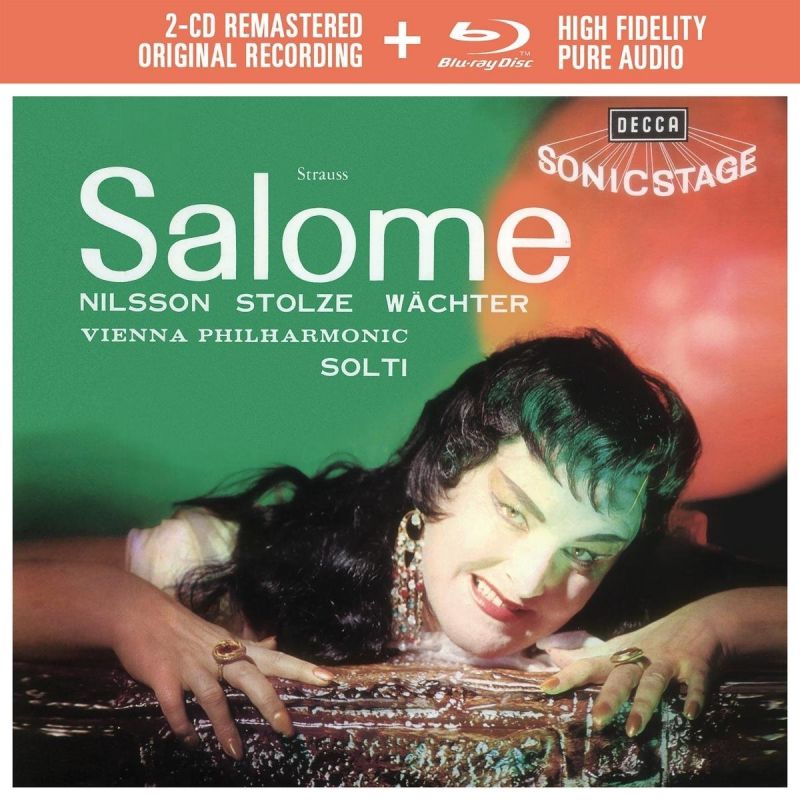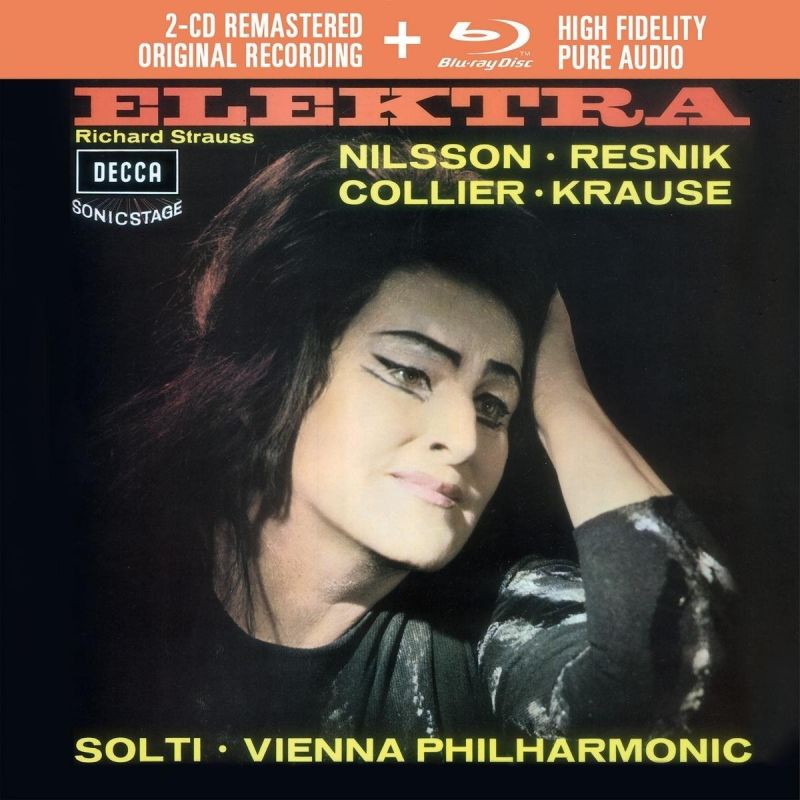STRAUSS Elektra. Salome (Solti)
View record and artist detailsRecord and Artist Details
Composer or Director: Richard Strauss
Genre:
Opera
Label: Decca
Magazine Review Date: 10/2017
Media Format: CD or Download
Media Runtime: 99
Mastering:
DDD
Catalogue Number: 483 1498DH03

Tracks:
| Composition | Artist Credit |
|---|---|
| Salome |
Richard Strauss, Composer
Aron Gestner, Jew Birgit Nilsson, Salome, Soprano Eberhard Wächter, Jochanaan, Baritone Georg Solti, Conductor Gerhard Stolze, Herodes, Tenor Grace Hoffman, Herodias, Mezzo soprano Heinz Holecek, 2nd Soldier Josephine Veasey, Page d' Hérodias, Mezzo soprano Kurt Equiluz, Jew Liselotte Maikl, Slave Max Proebstl, Jew Nigel Douglas, Second Nazarene Paul Kuen, Jew Richard Strauss, Composer Stefan Schwer, Jew Theodor Kirschbichler, Cappadocian Tom Krause, First Nazarene Vienna Philharmonic Orchestra Waldemar Kmentt, Naaraboth, Tenor Zenon Koznowski, 1st Soldier |
Composer or Director: Richard Strauss
Genre:
Opera
Label: Decca
Magazine Review Date: 10/2017
Media Format: CD or Download
Media Runtime: 108
Mastering:
DDD
Catalogue Number: 483 1494DH03

Tracks:
| Composition | Artist Credit |
|---|---|
| Elektra |
Richard Strauss, Composer
Birgit Nilsson, Elektra, Soprano Georg Solti, Conductor Gerhard Stolze, Aegisth, Tenor Marie Collier, Chrysothemis, Soprano Regina Resnik, Klytemnestra, Mezzo soprano Richard Strauss, Composer Tom Krause, Orest, Bass-baritone Vienna Philharmonic Orchestra |
Author: Hugo Shirley
The Salome dates from 1961, the Elektra from 1967 (although was it really on just two separate days, as Decca’s booklet says?), so from the periods directly preceding and following the sessions for the three Ring operas on which Birgit Nilsson sang Brünnhilde for Solti and producer John Culshaw. The great Swede stares out from the covers of both, doing her best crazed Salome look for one, embodying a thoughtful, pained Elektra for the other. Culshaw’s fingerprints can be detected as soon as you start listening – in the still striking scope of the ‘sonicstage’ recording and the penchant for special effects.
The Blu-ray audio format is far from ideal, requiring that a Blu-ray player of decent quality be hooked up to one’s hi‑fi – and it’s a shame, as I’ve said before, that Decca don’t offer downloads of the remastered 24‑bit 96kHz files as well. If you’ve got the hardware, though, the results are mightily impressive, with both scores coming across with an astonishing level of detail and clarity. You can hear every little jittery tremolo, every note of shimmering flutter-tongue, glistening glockenspiel or nervous peck of a harp. Rarely before has one been able to hear quite how outstanding the Vienna Philharmonic’s playing is on both sets, and the sound of the orchestra in tidied-up, hi‑res glory is magnificent.
With the Salome, Solti drives the orchestra hard. They keep up, but often at the expense of the score’s luxuriousness and colour. And although the conductor’s account of Salome’s Dance is surely one of the most viscerally exciting on record, one often gets the sense that both he and Culshaw did indeed view this score primarily as a tone poem: orchestra and conductor plough on, with singers forced to hold on. It’s an impression that’s exacerbated by a balance in which the orchestra is placed forward, the voices somewhat behind, and not always easy to pin down within Culshaw’s sonicstage.
None of this helps Nilsson’s Salome. She sings impressively, as one would expect, but often struggles in the circumstances to get the words across and therefore offers only an incomplete picture of the character. Eberhard Wächter’s Jokanaan, meanwhile, is rather small-scale, and struggles to assert himself amid so much orchestral hubbub – the conversation between him and Salome ahead of the curse strikes me as especially rushed. Gerhard Stolze – the only performer, along with Nilsson, to sing a principal role in both sets – stands out in the supporting cast as a brilliantly pointed and vivid Herod.
Elektra, of course, is one of the roles for which Nilsson was most famous, and you can hear why right from the opening monologue here. Her tirelessness, musicality and trademark laser-like tone mark out a formidable performance – the first on record, of course, to be presented uncut. Listening on Blu-ray audio, moreover, one hears afresh how carefully this recording is balanced, how Solti’s conducting – which had struck me as unsubtle and loud when listening to the recording previously – is actually carefully gauged and balanced much of the time. There are still passages where he seems to stick his head down into the score, especially those that are normally cut, and the excitement he whips up usually seems of a brittle, febrile sort, the sensuality skin-deep. But there’s no doubting the care that he takes with the orchestra or the virtuosity with which they respond.
Culshaw’s special effects are rather more controversial in Elektra, and neither they, nor some untidy edits, are helped much by the scrutiny afforded by the new format. Offstage voices sound artificial, while the various screams and laughs that bounce around – especially near the false revelation of Orestes’ death – are well-meaning but, to modern ears, preposterous. Full marks to Regina Resnik (larger than life as Klytemnestra) and Marie Collier (rather wobbly and wan as Chrysothemis) for commitment in that regard, though. Again, they were rather let down in the bass-baritone department (was there such a shortage in Vienna at the time?): Tom Krause, First Nazarene on the Salome, makes a decent but hardly compelling Orestes.
Neither of these sets would be a first choice for these operas these days. However, with one of the greatest LP-era Wagnerians in the title-roles, and often stunningly vivid playing from the Vienna Philharmonic under Solti, they remain landmark recordings. And if you think you already know them, give them a go on Blu‑ray audio format – they can still offer revelations.
Discover the world's largest classical music catalogue with Presto Music.

Gramophone Digital Club
- Digital Edition
- Digital Archive
- Reviews Database
- Full website access
From £8.75 / month
Subscribe
Gramophone Full Club
- Print Edition
- Digital Edition
- Digital Archive
- Reviews Database
- Full website access
From £11.00 / month
Subscribe
If you are a library, university or other organisation that would be interested in an institutional subscription to Gramophone please click here for further information.




